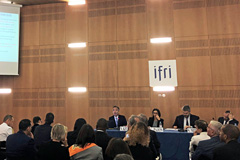JICA-RI Visiting Fellow Kitano Gives a Presentation at Conference ‘the Franco-Japanese Cooperation in Africa: After the G7 and TICAD 7’
2019.09.27
JICA Research Institute (JICA-RI) Visiting Fellow Naohiro Kitano attended "The Franco-Japanese Cooperation in Africa: After the G7 and TICAD 7," a conference sponsored by the Institut français des relations internationales (Ifri) in Paris on Sept. 6, 2019. At the first session, "Opportunities and challenges for France-Japan economic cooperation in Africa," he gave a presentation on the outcomes of the seventh Tokyo International Conference on African Development (TICAD 7) and the possibilities for Japanese-French cooperation in Africa.

JICA Research Institute Visiting Fellow Naohiro Kitano gave a presentation on the outcomes of TICAD 7
Céline Pajon, research fellow, head of Japan research, Center for Asian Studies, Ifri, who led the session, began by talking about the aims of the conference. Taking place just after the 45th G7 summit in Biarritz, France, and TICAD 7, the conference's purpose is to discuss the possibilities for Franco-Japanese cooperation in the fields of economics and security, she explained.
Kitano said that as an open platform for discussing development in Africa, TICAD 7 drew the participation of many stakeholders, including from 53 African countries, and ended successfully. He also talked about how Japanese development cooperation places an emphasis on developing industrial human resources and infrastructure toward promoting Japanese companies’ private investment in Africa, which will be a pillar of future Japan-Africa cooperation.
He then discussed the possibility of a partnership between JICA and the French Development Agency (AFD) in Africa. Specifically, he discussed the possibility of the two agencies partnering on three plans. The Mombasa Special Economic Zone Master Plan in Kenya in the Northern Economic Corridor and the West Africa Growth Ring Corridor Master Plan that connects Ivory Coast, Ghana, Togo and Burkina Faso are two of them. They are among the three economic corridor plans mentioned in the TICAD 7 Yokohama Action Plan. The other is the Greater Abidjan Urban Master Plan in Ivory Coast.
Finally, he touched on the geographical concept of Afrasia, which includes both Africa and Asia. He said Japan can think of Africa as a neighboring continent to Asia rather than one that is far away, and that interaction between Afrasia and Africa-Europe could create new opportunities for development.
Sébastien Minot, vice director for Sub-Saharan Africa, AFD, then gave a presentation that included the outcomes of the G7 and an overview of the AFD and its work in Africa. Discussant Patrice Fonlladosa, president, MEDEF (Mouvement des entreprises de France) Africa, commented that regarding development assistance to Africa, it is necessary to assume rapid population increase, that both the public and private sectors could work on job training, for example, and that peace and security are indispensable to the socioeconomic development of Africa.
In response, Kitano said the most important issues for responding to a rapid population increase are human resource development, job creation and accommodating urbanization. He added that Japan learned from examples in Asia including Cambodia, Vietnam and Mindanao, the Philippines, that peace and stability are essential preconditions to socioeconomic growth.
A lively, wide-ranging question-and-answer session among participants followed.

事業事前評価表(地球規模課題対応国際科学技術協力(SATREPS)).国際協力機構 地球環境部 . 防災第一チーム. 1.案件名.国 名: フィリピン共和国.

事業事前評価表(地球規模課題対応国際科学技術協力(SATREPS)).国際協力機構 地球環境部 . 防災第一チーム. 1.案件名.国 名: フィリピン共和国.

事業事前評価表(地球規模課題対応国際科学技術協力(SATREPS)).国際協力機構 地球環境部 . 防災第一チーム. 1.案件名.国 名: フィリピン共和国.

事業事前評価表(地球規模課題対応国際科学技術協力(SATREPS)).国際協力機構 地球環境部 . 防災第一チーム. 1.案件名.国 名: フィリピン共和国.

事業事前評価表(地球規模課題対応国際科学技術協力(SATREPS)).国際協力機構 地球環境部 . 防災第一チーム. 1.案件名.国 名: フィリピン共和国.
scroll